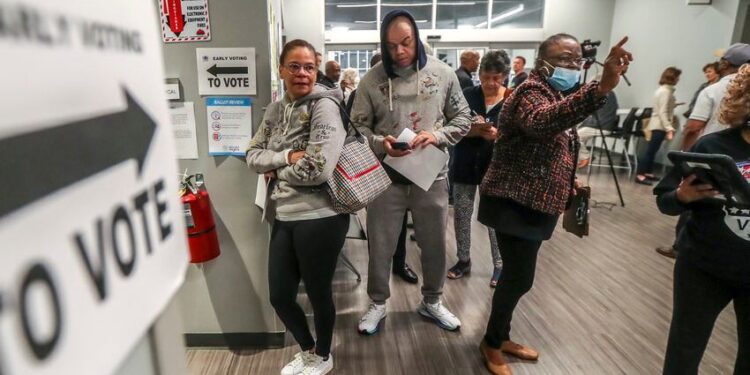A few dozen voters lined up early at the Buckhead Library in Atlanta for the start of early voting on Monday, October 17, 2022. (Photo: John Spink / John.Spink@ajc.com). Img source: www.ajc.com
April 15, 2024 Story by: Editor
In a late-night session on Friday, Georgia lawmakers passed significant changes to state election laws. The new legislation broadens the criteria for challenging voter registrations, eliminates bar codes from printed ballots, and increases the documentation required from local election officials to certify elections.
The changes are set to take effect on July 1, pending Governor Brian Kemp’s signature.
Voting rights groups are particularly concerned about Senate Bill 189, which they argue could lead to an increase in voter registration challenges. Senate Bill 189 aims to streamline the process of challenging voter registrations, making it easier for individuals or groups to question the eligibility of registered voters. Conservative groups have already been systematically challenging large numbers of voters, particularly in districts like Atlanta’s Fulton and DeKalb counties. Current law requires each challenge to be evaluated individually, which can overwhelm local election resources, voting rights advocates warn.
“In past cycles, we have seen ordinary people who would come in and challenge hundreds of voters because of different lists,” said Andrea Young, executive director of the American Civil Liberties Union of Georgia. “In 2022 there was kind of sort of a gray area. Now with this, it is almost encouraging … really anti-democratic vigilantes to come in and challenge your right to be on the voting list.”
The new law outlines specific conditions for challenging a voter’s registration, such as registering in another state, using a different address for a homestead tax exemption, or registering at a nonresidential address. Challenges are not allowed within 45 days of an election.
During the 2022 Senate election, Republican candidate Herschel Walker faced scrutiny over his residency after reporters discovered he had a homestead exemption in Texas.
The legislation also prohibits the use of post office boxes as mailing addresses for voter registration. This poses a problem for small towns like Pine Lake in DeKalb County, where residents rely on post office boxes due to the lack of home mail delivery.
Additionally, the bill mandates that homeless individuals use the county registrar’s office as their mailing address for voter registration. Anti-homelessness advocates argue this could complicate the lives of both the homeless and county registrars and may violate the National Voter Registration Act.
“What we’re saying is that it should be easy for every citizen to vote,” Young said. “That’s what makes this a democracy. And all of these tricks to try to create barriers for Georgia citizens to have a voice in their government is anti-democracy.” Source: The Guardian
The bill passed mostly along party lines, despite objections from Georgia’s Republican Secretary of State, Brad Raffensperger, who argued that significant changes to election law should not be made so close to the 2024 election.
“We know there is a national coordinated movement to challenge voters, to go and talk about how the voter lists are outdated and bloated,” said Kristin Nabors, state director for All Voting Is Local. “They’re just not. We have extremely clean voter rolls in Georgia. This is not a bill that we need, and particularly not in an election year.”
Senate Bill 189 also mandates that election officials use the printed text on a ballot to count votes instead of bar code scanning. It requires absentee votes and advanced voting totals to be tabulated within one hour of polls closing on election day. Additionally, anyone handling ballots or key election equipment must sign a tracking document to ensure chain of custody and use tamper-proof containers.
“This quantifies the fact that as ballots move through the process, they are properly documented and properly controlled,” said state senator Max Burns, a sponsor of the bill.
Recently, two Republican-appointed members of the Fulton County Board of Registration and Elections voted against certifying the March presidential primary, citing a lack of access to chain-of-custody documentation.
Opponents argue that the chain of custody requirement could be used as a pretext to reject future elections for technical reasons unrelated to the actual vote count.
The bill also removes the Secretary of State as an Ex Officio member of the state elections board and requires officials to provide high-resolution copies of ballots.

















